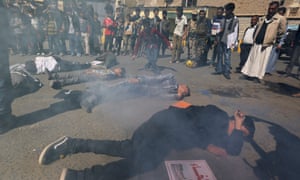Owen Bowcott Legal affairs correspondent
UK government breaches arms trade treaty by selling arms while Yemeni civilians being hit by Saudi-led coalition, say lawyers

Yemenis play the victims of an airstrike during a protest against ongoing Saudi-led coalition military operations. Photograph: Yahya Arhab/EPA
UK government breaches arms trade treaty by selling arms while Yemeni civilians being hit by Saudi-led coalition, say lawyers

Yemenis play the victims of an airstrike during a protest against ongoing Saudi-led coalition military operations. Photograph: Yahya Arhab/EPA
UK arms sales to Saudi Arabia are fuelling the civil war in Yemen and breach domestic, European and international law obligations, according to legal opinion obtained by Amnesty and other human rights groups.
The UK government has known for months that the weapons systems it supplied to Saudi forces have been used against civilian targets, the report released on Thursday maintains.
A British-made cruise missile, manufactured by Marconi, destroyed a ceramics factory in a village west of the capital, Sana’a, killing at least one civilian, it was alleged last month.
The Yemen war involves a Saudi-led coalition of Sunni Arab states that has launched an all-out air campaign against the Iranian-backed Houthi armed groups who seized Sana’a a year ago. Saudi Arabia’s aim is to reinstate Yemen’s president, Abdu Rabu Mansour Hadi, who fled last year as the insurgency gained ground.
It has turned into a humanitarian crisis with civilian targets, including hospitals, schools, markets, grain warehouses, ports and a displaced persons camp, being hit by Saudi-led coalition forces.
Since the conflict escalated in mid-March 2015, more than 5,800 people have been killed, tens of thousands wounded and 2.5 million have been forced to flee their homes. More than 80% of the country’s population of 21 million are in need of humanitarian aid, including 2 million children at risk of malnutrition.
The legal opinion of Prof Philippe Sands QC, Prof Andrew Clapham and Blinne Ní Ghrálaigh of Matrix Chambers, was commissioned by Amnesty International UK and Saferworld, both members of the Control Arms coalition.
The lawyers argue that, on the basis of the information available, the British government is breaching its obligations under the UK’s consolidated criteria on arms exports, the EU common position on arms exports and the arms trade treaty by continuing to authorise transfers of weapons and related equipment to Saudi Arabia.
The lawyers conclude: “Any authorisation by the UK of the transfer of weapons and related items to Saudi Arabia … in circumstances where such weapons are capable of being used in the conflict in Yemen, including to support its blockade of Yemeni territory, and in circumstances where their end use is not restricted, would constitute a breach by the UK of its obligations under domestic, European and international law.”
The legal opinion also states that the UK government can, since at least May 2015, be deemed to have “actual knowledge ... of the use by Saudi Arabia of weapons, including UK-supplied weapons, in attacks directed against civilians ... in violation of international law.”
The government insists it is not taking part in the military campaign in Yemen. Last month, a spokesman said: “Her Majesty’s government takes its arms export responsibilities very seriously and operates one of the most robust arms export control regimes in the world. We rigorously examine every application on a case-by-case basis against the consolidated EU and national arms export licensing criteria. Risks around human rights abuses are a key part of our assessment.”
But Amnesty and Saferworld point out that more than 100 licences for arms exports to Saudi Arabia have been issued since bombing in Yemen began in March 2015. For the period from January to June 2015, UK licences for exports to Saudi Arabia were worth more than £1.75bn, the human rights groups say, the vast majority of which appear to be for combat aircraft and air-delivered bombs for the use of the Royal Saudi air force.
In 2013, David Cameron hailed the arms trade treaty as a landmark agreement that would “save lives and ease the immense human suffering caused by armed conflict around the world”.
The director of Amnesty International UK, Kate Allen, said: “The UK has fuelled this appalling conflict through reckless arms sales which break its own laws and the global arms trade treaty it once championed.
“This legal opinion confirms our long-held view that the continued sale of arms from the UK to Saudi Arabia is illegal, immoral and indefensible. Thousands of civilians have been killed in Saudi-led airstrikes, and there’s a real risk that misery was ‘made in Britain’. The UK must halt these arms sales immediately.”
Saferworld’s executive director, Paul Murphy, said: “UK government policy on Yemen is in disarray. The UK gives aid to Yemen with one hand, while supporting the destruction of the country with the other.
“With the start this week of the first direct peace talks since the beginning of the conflict in Yemen, the UK government should help turn the current ceasefire into a permanent peace by stopping its support to one side of the conflict. It’s time the UK acted as a peace broker, rather than an arms broker. The UK government must halt these arms sales immediately.”
Amnesty International and Saferworld are calling on the UK government to suspend arms transfers to Saudi Arabia, redouble diplomatic effort to help bring the conflict to an end and push for an end to the blockade so that humanitarian and commercial supplies can enter Yemen.
http://www.theguardian.com/world/2015/dec/17/uk-yemen-civil-war-arms-sales-saudi-arabia





0 Comments